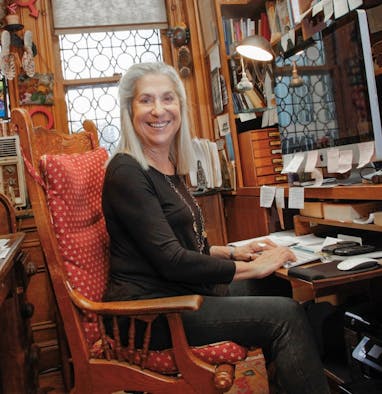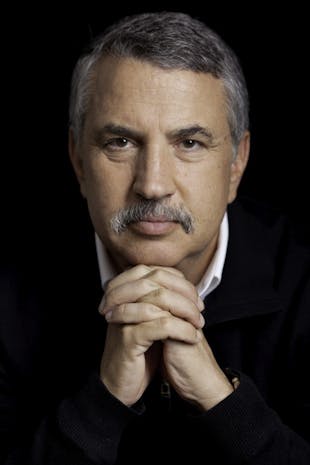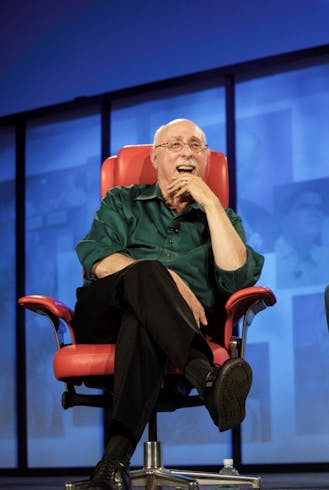Justice alumni reflect on time at Brandeis
The Justice interviewed three alumni who are prominent journalists and authors.
For the 70th anniversary of the Justice, we thought it fitting to interview three alumni who are prominent journalists and authors. Here’s how Brandeis shaped the careers and character of Letty Cottin Pogrebrin ’59, Thomas Friedman ’75 and Walt Mossberg ’69.
Letty Cottin Pogrebrin ’59

Photo Courtesy of Letty Cottin Pogrebrin ’59,
Photo by Mike Lovett
Pogrebin is a founding editor of Ms. magazine, a social justice activist, a renowned author and a lecturer.
How did your experience at Brandeis shape where you are now?
Writing for the Justice and working with other students who valued print journalism helped solidify my goal of becoming a professional writer. Though in those years I wasn’t sure what genre suited me best, but I eventually published eleven books and more than a thousand articles and op-eds.
However, I’m an advocacy journalist whose goal is to persuade readers the rightness of a cause — whether it’s women’s equality, racial and economic justice or the urgency of a two-state solution to the Israeli-Palestinian conflict. In many ways, Brandeis taught me that advocacy and activism are the rent you pay for living on this planet.
Why did you choose Brandeis?
Because it was young and vibrant and by the time I was ready to apply to college, I felt I knew something about the school; its atmosphere and ethos. My mother was a member of the Brandeis Women’s Committee from when it was founded. In my early teens, I used to thumb through the Women’s Committee bulletin, and the photos of student life on campus made me want to go there.
Was there a professor who had a particularly important impact on you?
Several of my professors left a deep imprint on my intellectual and political development, most notably Herbert Marcuse, with whom I took a course in American Communism, Philip Rahv, who taught the Russian novel and a course on early American literature, and Abraham Maslow, my psychology professor whose “Hierarchy of Needs” course helped me make sense of human needs and priorities.
I wish I could name a female professor, but women academics were few and far between at Brandeis in the early years. I had only one — a French professor. But I do recall with great pleasure when one of the guest lecturers in my [general education] course was Eleanor Roosevelt, who was known as “First Lady of the world.” At that point, she was retired from the U.N., where she was the first U.S. delegate and the first chair of the U.N. Commission on human rights, but she was still an active spokesperson.
How did Brandeis prep you for the real world?
By teaching me to question authority, and clarifying that while everyone has a right to be heard, not everyone is always right — even your professors.
What would you want current and/or prospective students to know about Brandeis?
The best of Brandeis is the gritty part of our history, the transgressive part, the oppositional instincts we acted upon in the fifties, when most American college students were politically passive and complacent. Brandeis students were always resisting something or other, whether it was Soviet Russia’s invasion of Hungary, Dr. Sachar’s decision to raze the apple orchard to make way for the science building (we lost), or the University’s sexist dress code which prohibited women from wearing pants. (That, we won.)
Three words to describe your Brandeis experience.
Affirming. Empowering. Joyful.
Thomas Friedman ’75

Photo Courtesy of Thomas Friedman ’75,
Photo by Josh Haner/The New York Times
Friedman is a columnist for The New York Times, an internationally renowned reporter, an author and a three-time Pulitzer Prize winner.
How did your experience at Brandeis shape where you are now?
The most important thing Brandeis did was propel me into being a Marshall Scholar at Oxford University where I got a graduate degree in Arabic and Middle East Studies. Brandeis really prepared me for that. Brandeis also came at a time right after my father died suddenly, when I needed to be in the warm embrace of community. And that’s what Brandeis gave me: I met one of my best friends to this day, Victor Friedman, at Brandeis, and another good friend, Randy Levitt, who introduced me to my wife. I wouldn’t be where I am today without several important stepping stones — and Brandeis was one of them. A lot of really good things happened there.
Why did you choose Brandeis?
They had a Middle East Studies program, and I knew that’s what I wanted to focus on. And my sister had a boyfriend who went there. I liked him, and he spoke fondly of Brandeis. I transferred to Brandeis my junior year.
What were your favorite spots on campus?
I liked going to Friday night services, so the spot with the three chapels around the pond was one of my favorites.
Was there a professor who had a particularly important impact on you?
My favorite professor was Elanie Leffler; she taught me to love art history. And my advisor, Gordon Newby, who taught Arabic and really prepared me to take on the Middle East.
What would you want current and/or prospective students to know about Brandeis?
Brandeis has really high quality academics and a nice community where you can find like- minded people and forge your own community. College is about what you learn and who you meet — and I made lifelong friends.
Describe your Brandeis experience in three words.
Warm. Intellectually rigorous. A springboard.
Walt Mossberg ’69

Photo Courtesy of Walt Mossberg ’69,
Photo by Asa Mathat
Mossberg is a veteran technologist columnist, commentator, reviewer and conference producer. He is widely credited with pioneering the modern, consumer-focused, technology review and commentary at The Wall Street Journal. He also co-founded AllThingsD, Recode and the D and Code Conferences, and co-created and co-hosted a popular podcast, Ctrl-Walt-Delete.
How did your experience at Brandeis shape where you are now?
The biggest thing from Brandeis that has shaped my life was the political activism: the anti-war, anti-administration in some cases, civil rights and civil disobedience that was going on in the 1960s. I had rigorous classes and professors who influenced me, but I learned as much outside the classroom as I did inside the classroom. We had strikes. We marched on the Pentagon.
We did sit-ins in front of the administration building to keep the Dow chemical recruiter from getting inside to meet with students because Dow made napalm. We took over a building and made it a sanctuary and protected an AWOL soldier from Vietnam; we created a ring of bodies around him that the army and police didn’t want to go in and ambush. There was a Ford Hall takeover by the Black students and the state police were on campus ready to move in with guns. There was a big mediation effort by the student government, and thank God it was resolved. In fact, it’s the 50th anniversary of the African American Studies department, which was formed as a result of one of the demands of that takeover.
Most of the campus — whether it was in a moderate way or a radical way, or whether it was a national or campus issue — got involved.
Was there a professor who had a particularly important impact on you?
In my senior year, I, along with two other students, one of whom is my best friend to this day — Ira Shapiro — got a grant to do an independent studies paper on George Wallace. That was thanks to a professor in the politics department — my major — Gene Bardack. We wrote a 450 page independent studies paper on Wallace, who in 1968 ran for president. We each had sections; mine was Wallace and the media, and I went on Wallace’s campaign plane representing either the Justice or WBRS. We were on this terrible two propeller junky plane that a segregationist had lent him. But there were genuine reporters on that plane and that’s where I learned what it was like to cover a presidential campaign.
Any favorite spots on campus?
For my first two years at Brandeis, my then-girlfriend and now wife lived in Massell. There was this enormous lawn between the chapels that almost went all the way to Sherman. We used to hang out there; when the weather was nice it was a great thing.
How did Brandeis prepare you for the “real world?”
The biggest lesson I learned that helps if you’re going to be a journalist, and perhaps other fields too: Question authority and don’t be afraid to take a stand.
What would you want current and/or prospective students to know about Brandeis?
Brandeis is an unusual place. Take courses in everything you can from the smartest professors and try to stand out. Find a path for yourself; it doesn’t have to be your life’s career path, that can change, but you ought to find a path for yourself while you’re there — whether it’s music, art, politics or journalism — and pursue it.
Describe your Brandeis experience in three words.
Love. Friendship. Protest.



Please note All comments are eligible for publication in The Justice.